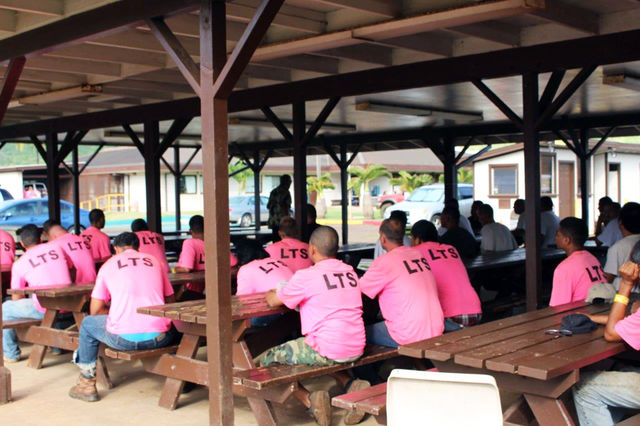LIHUE — A recently captured fugitive told social workers in 2015 that he wanted to serve out the remainder of his time at Halawa Correctional Facility and if he ran, it would be a long time before he was caught by authorities, according to documents from the Department of Public Safety.
It took the U.S. Hawaii Marshals Hawaii Task Force more than a year to capture 45-year-old Orlando Manguchei after he left his transitional home in Kapaa.
Prosecutors this week filed additional charges against Manguchei for leaving the transitional home in 2015. In that case, he is facing five years in prison.
Last week, Manguchei pleaded not guilty to two charges of possession of a prohibited firearm for offenses he allegedly committed in 2014, for which he faces a maximum of up to 40 years in prison. His trial is set for Oct. 3.
“Given this defendant’s criminal history, history of violence towards law enforcement, and failure to respond to rehabilitative efforts in the past, he should have never been furloughed, as the Hawaii Paroling Authority recognized when they maxed him out on his parole violation,” Prosecuting Attorney Justin Kollar told The Garden Island Monday.
Kauai police officers located Manguchei on June 17 in Kalaheo and when Manguchei saw the officers, he ran, according to a county news release.
Manguchei was holding a handgun while running from officers and was found with four Kauai Humane Society dogs that were reported stolen in May, the release said.
KHS Director Penny Cistaro said the dogs belonged to Manguchei and no evidence suggests he is the one who stole them. The humane society will hold the dogs for him or a relative, she said.
Manguchei left his transitional home on Jan. 14, 2015 and in letter dated Jan. 15, 2015, Kauai Community Correctional Center Warden Neal Wagatsuma informed the Department of Public Safety Director Nolan Espinada about the furlough escape.
Manguchei was scheduled to be transferred to Halawa Correctional Facility “because of his long history within the criminal justice system and prison system and the fact that he has never been amenable to programming at this facility,” Wagatsuma said in the letter.
Manguchei was admitted to Kauai Community Correctional Center on March 15, 2014 on a parole violation charge and was initially serving time for terroristic threatening and third-degree promotion of a dangerous drug.
He was scheduled to be discharged on Aug. 11, 2015.
In the letter, Wagatsuma said he was “well-aware of (Manguchei’s) feared reputation with law enforcement and his ability to evade capture,” but that the inmate had participated in both the Module Contract Program and Lifetime Stand program and had done well.
Wagatsuma also said he acknowledged the “considerable effort” it took for U.S. Marshals and KPD to arrest him for his parole violation.
On Sept. 2, 2014, Manguchei was granted work release and on Oct. 31, 2014, although Manguchei expressed apprehension, he agreed to be furloughed at a transitional home in Kapaa where he would remain until he left, according to the warden’s letter.
Manguchei worked at Kauai Coffee until Jan. 15, 2015 when he failed to show up to work.
In the letter, Wagatsuma said Manguchei spoke to a social worker on the day following Manguchei’s departure from the home and said “(Manguchei) just wanted to do the rest of his time in HCF.”
He also said that it was not his intent to run, “because if it was, it would be a long time before he was captured,” according to the warden’s letter.
He was captured on June 17, more than a year and half later.
Toni Schwartz, spokeswoman for Department of Public Safety, said the work furlough program is open to Hawaii inmates who fully complete mandatory rehabilitative, treatment, educational and vocational programs.
Although she did not comment specifically on Manguchei, she said the plan is “professionally prescribed for each inmate.”
“Participants must have acceptable behavior, (which means) no violence, criminal (and or) gang activity or general misconducts during their incarceration,” Schwartz said. “They must also sustain this good behavior while behind bars. Inmates failing to meet these strict standards are forbidden from participating in the work furlough program.”
Manguchei was on extended furlough, which is the “final step towards reintroduction into a community before release,” Schwartz said.
There about 400 inmates in the furlough program statewide and about 5 percent of the total population will deviate in some way, Schwartz said. That includes things like returning late, failing to check in or testing positive for drugs, she said.
“Less than 1 percent of total furlough population actually commits a new crime,” Schwartz said. “All deviations are considered serious and we are working with those individuals to help them better identify the causes of such issues.”
Schwartz said the work furlough program is meant to gradually allow detainees and inmates to reenter the community.
“Inmates who leave without going through the program skip a critical step that teaches them better decision making and self-sufficiency, and allows staff to help correct possible lapses in judgement before they reenter their community,” she said. “Ninety-five of incarcerated people will return to their community. Without this program, most of them will likely commit new crimes and return to prison.”
Manguchei took part in the LifeTime Stand program, which includes substance abuse, cognitive skills, anger management, college course and work furlough. He also took part in the Module Contract program, which is available to pretrial and sentenced inmates.
At KCCC, the warden conducts two daily meetings with both groups, nearly 70 percent of the entire population, Schwartz said. Participants are expected to be honest, motivated, disciplined and committed.
There are nearly 200 inmates at KCCC.
Manguchei is not eligible for work furlough for the next seven years, Schwartz said.






